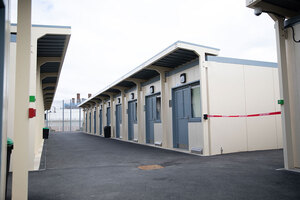Further rollout of Rapid Deployment Cells to boost prison places
A further 160 new modular prison cells designed to quickly boost jail capacity and keep the public safe are set to open at HMP Hollesley Bay in Suffolk next week.

- 160 Rapid Deployment Cells unveiled at HMP Hollesley Bay
- part of 20,000 additional prison places portfolio, in addition to extra 1,900 prison spaces created since September
It is the latest batch of 1,000 Rapid Deployment Cells being rolled out at 18 prisons to meet rising demand for places driven by the lasting impact of the pandemic and exacerbated by last year’s barristers’ strike.
Since September 2022, the government has boosted prison capacity by an additional 1,900 places. This has been achieved through measures including greater use of double occupancy of cells where it is safe to do so and delaying non-urgent maintenance work.
These shorter-term measures sit alongside the government’s major 20,000 prison place building programme – the largest since the Victorian era – which gathers pace.
Prisons Minister, Damian Hinds, said:
The government will stop at nothing to ensure we have enough prison cells to take dangerous criminals off the streets.
These measures to create a further 1,900 places are providing extra capacity to deal with immediate pressures stemming from the pandemic and its impact on the justice system.
The almost £4 billion investment to deliver additional prison places will see 6 state-of-the art new jails constructed, with the 1,700 capacity HMP Five Wells already open.
The second of these new prisons, the 1,715-capacity HMP Fosse Way near Leicester, will have its official opening next week and construction is well underway at HMP Millsike in East Yorkshire which will hold nearly 1,500 prisoners when full.
Rapid Deployment Cells have a lifespan of around 15 years and are providing extra capacity to meet some of the rising demand seen following the pandemic and criminal barristers’ strike last year, while longer-term expansion is underway. The remand population is around 5,000 higher than before the pandemic and the criminal barristers’ strike which followed.
By creating extra space, the new rapid cells also aid the smooth running of prisons by giving governors more choice in how they manage prisoners day-to-day. Along with other measures we have taken, it has reduced the need to use police cells made available through Operation Safeguard – the agreed process which provides additional overnight capacity.
Non-urgent maintenance work is being staggered so that fewer cells are taken offline at any one point in time. Priority maintenance which is required for safety reasons or which is helping boost capacity has continued. In addition, where safe to do so, further cells have been made double occupancy, creating around 800 extra prison places.